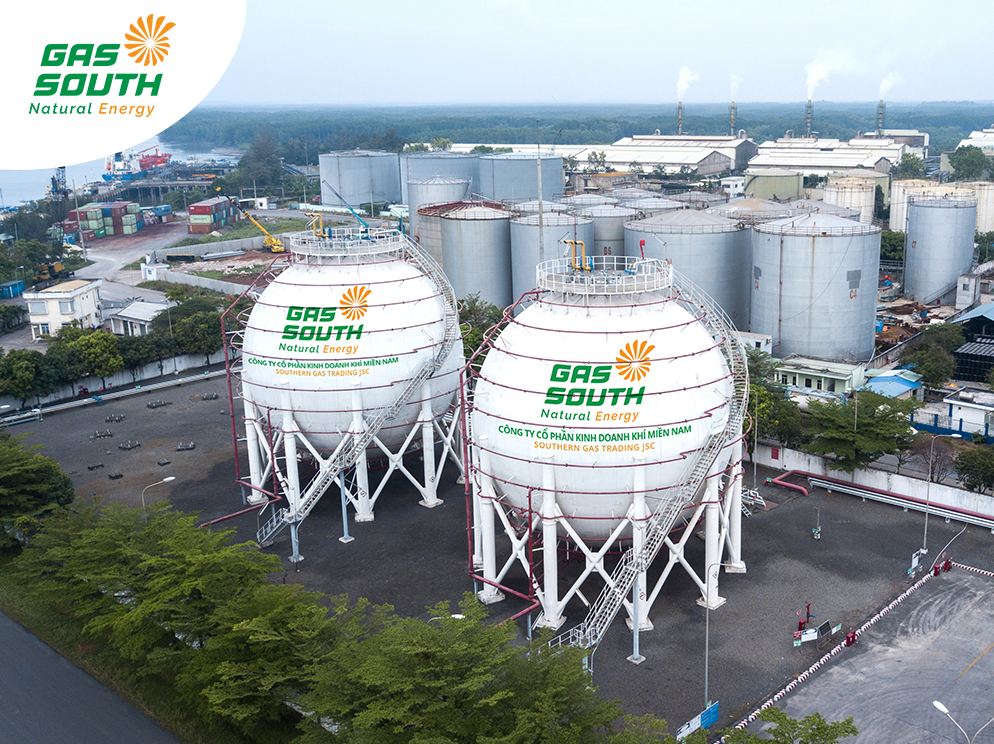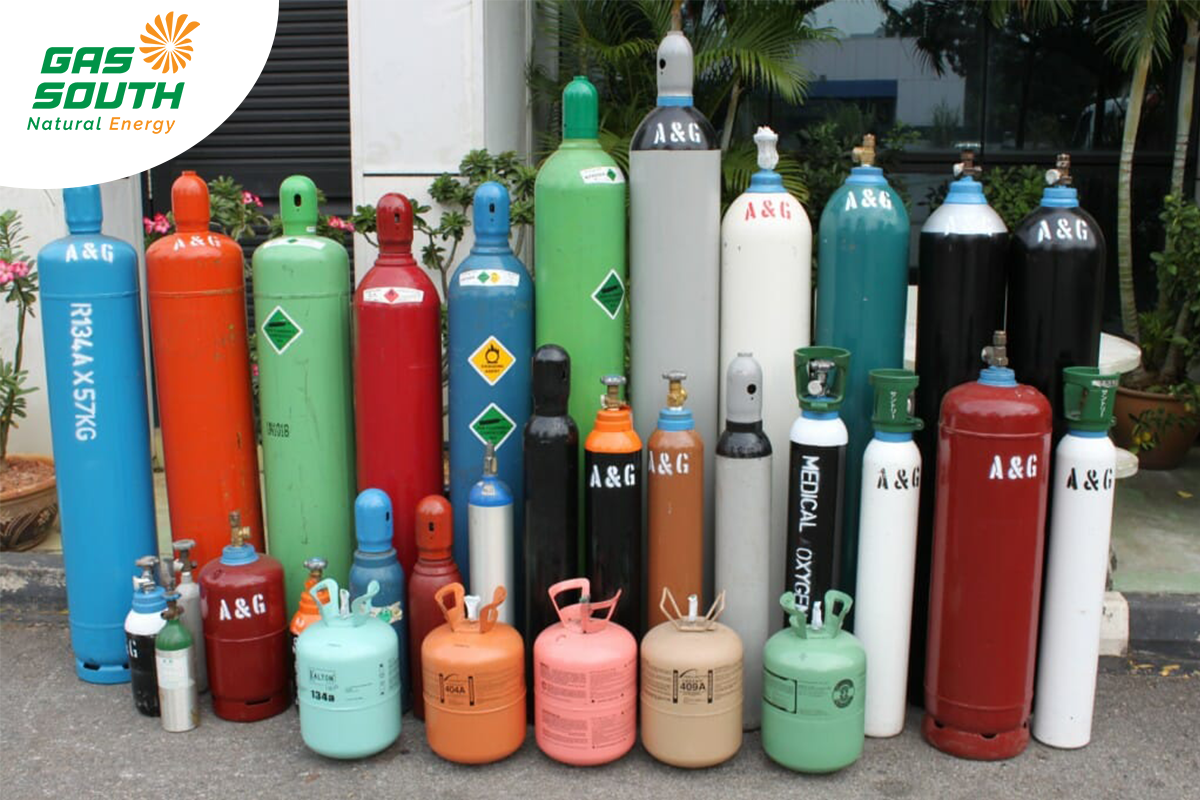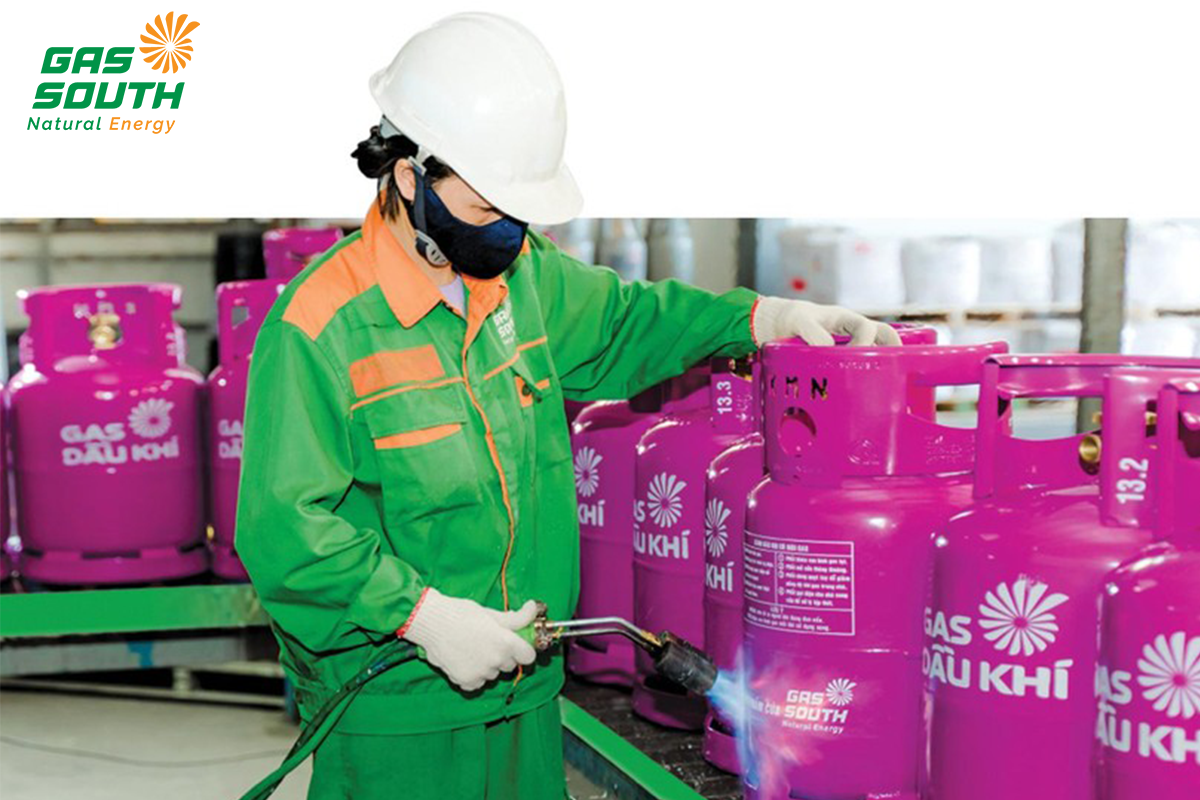Currently, industrial gases are increasingly widely used and play a crucial role in various production sectors. However, not everyone knows what industrial gases are and how they are applied in different industries. In the following article, let's explore an overview of the industrial gas industry with Gas South to have a better understanding of the most common types of industrial gases today!
1. An introduction to industrial gases
1.1 What exactly is industrial gas?
Industrial gases are simply gases created for use as inputs in industrial manufacturing. Industrial gas is particularly crucial to several significant industries, including mining, metallurgy, chemicals, petro refining, power generation as well as oil and gas production. Additionally, industrial gas is also used in other fields such as medicine, electronics, aerospace, and nuclear energy.

Industrial gas is a gas used in industries
1.2 The establishment and development process of the industrial gas industry
The industry of industrial gases has a long history of formation and development, spanning various historical periods. Humans first discovered air and regarded it as the first industrial gas. Subsequently, other types of gases were gradually discovered and widely used in daily life and production. In particular, during the industrial revolution in the 18th and 19th centuries, a series of important industrial gases were discovered, including:
-
1754: Discovery of Carbon Dioxide
-
1766: Discovery of Hydrogen
-
1772: Discovery of Nitrogen and Nitrous Oxide
-
1773: Discovery of Oxygen gas
-
1774: Discovery of Ammonia and Chlorine gases
-
1776: Discovery of Methane
-
1777: Discovery of Hydrogen Sulfide
-
1800: Discovery of Carbon Monoxide
-
1810: Discovery of Hydrogen Chloride
-
1836: Discovery of Acetylene
-
1868: Discovery of Helium
-
1886: Discovery of Fluorine
-
1894: Discovery of Argon
-
1898: Discovery of Neon and Xenon
-
1899: Discovery of Radon
-
…..
Initially, industrial gases were produced in very small quantities and mainly used in laboratories. Later on, as the demand from industrial sectors grew, these gases were produced in larger quantities. Large-capacity companies and factories were established, forming the industrial gas production industry as it is today.
2. Types of industrial gases commonly used today
Depending on their usage and origin, industrial gases can be classified into different types. The following types of industrial gases are the most commonly used:
-
Industrial gases extracted from the air: including oxygen, nitrogen, and argon.
-
Elemental industrial gases: including hydrogen, fluorine, chlorine, etc.
-
Industrial gases in the compressed gas group: including helium, xenon, neon, krypton, etc.
-
Industrial gases in the natural gas group: including gases extracted from petroleum or natural gas sources such as liquefied natural gas (LNG), compressed natural gas (CNG), and liquefied petroleum gas (LPG), which are often used as fuel or for extracting other hydrocarbons.
-
Other types of industrial gases include ammonia, ethylene, etc.…
Read more: What are the differences between CNG, LNG and LPG?

Some common types of industrial gas
3. Production process.
Depending on the intended use, various methods are employed to separate air and synthesize gases to achieve different levels of purity. In the 19th century, gases like hydrogen, acetylene, chlorine, hydrogen sulfide, and carbon dioxide were produced through basic gas transformation reactions using the Kipps apparatus. With the invention of electricity, hydrogen and oxygen were generated through water electrolysis.
Liquid oxygen and liquid nitrogen were first produced in 1883, followed by liquid hydrogen in 1898. Natural gases were produced later: liquefied petroleum gas (LPG) was manufactured in 1910, and liquefied natural gas (LNG) in 1914. Over time, the methods of industrial gas production have been continuously improved and refined. After extraction, most industrial gases are liquefied and stored in compressed gas containers for easy transportation and use.

Industrial gases are usually stored in compressed air cylinders
4. The role of industrial gases in production and daily life today
Industrial gases play an increasingly important role in many industries and human life. Some specific roles can be mentioned as follows:
-
Serving important industries such as steelmaking, metal cutting and welding, refrigeration, electronics, petroleum industry, etc.
-
Supplying energy: compressed natural gas (CNG), liquefied petroleum gas (LPG), etc. are increasingly used as alternative fuels to gasoline, diesel and coal to supply energy in heavy industries, transportation and processing industries.
-
Serving light industries such as food processing, pharmaceutical manufacturing, etc.
-
Contributing to improving human life: providing gases used in healthcare, supplying gases for food preservation and processing, providing refrigerant gases for air conditioning, refrigerators, etc.
-
Providing gaseous raw materials for laboratories and scientific research centers.
5. Joint Stock Company (Gas South) - Leading supplier of CNG, LNG, LPG
Currently, Gas South - Southern Gas Trading Joint Stock Company is a leading producer and distributor of industrial gases with 3 main products: liquefied natural gas (LNG), compressed natural gas (CNG), and liquefied petroleum gas (LPG). With modern facilities and strong supply capacity, Gas South is ready to meet all-natural gas needs of customers, specifically:
-
Gas South owns 4 LPG storage facilities with a total capacity of 8,100 tons.
-
The distribution system stretches from Nghe An to Ca Mau with 17 LPG filling stations with an average capacity of 17,100 tons/month.
-
Over 100 specialized trailers and a system of more than 40 CNG stations with a total output of more than 100 million Sm3/year.
-
Ready to provide services for the production, distribution, and transportation of natural gases (CNG, LPG, LNG), construction, installation and maintenance of gas facilities for industrial, commercial, and residential sectors.
Read more: What is natural gas compression and related helpful information?

Gas South - Leading supplier of LNG, CNG, LPG
If you need to learn more about Gas South's natural gas products, please contact us directly for a quote and direct consultation through the following channels:
-
Head office: 4th Floor, PetroVietnam Tower, 1-5 Le Duan Street, District 1, Ho Chi Minh City
-
Email: lienhe@psg.com.vn
-
Phone number: 028.3910 0108 - 028.3910 0324
-
OA Zalo: https://zalo.me/gassouth18006776
In conclusion, Gas South has helped customers quickly understand the industrial gas industry. Hopefully, after reading this article, you have learned what industrial gases are and some practical applications of industrial gases in production and daily life. If you need more in-depth information about industrial gases, please leave a comment below this article or contact Gas South directly for a free consultation!



